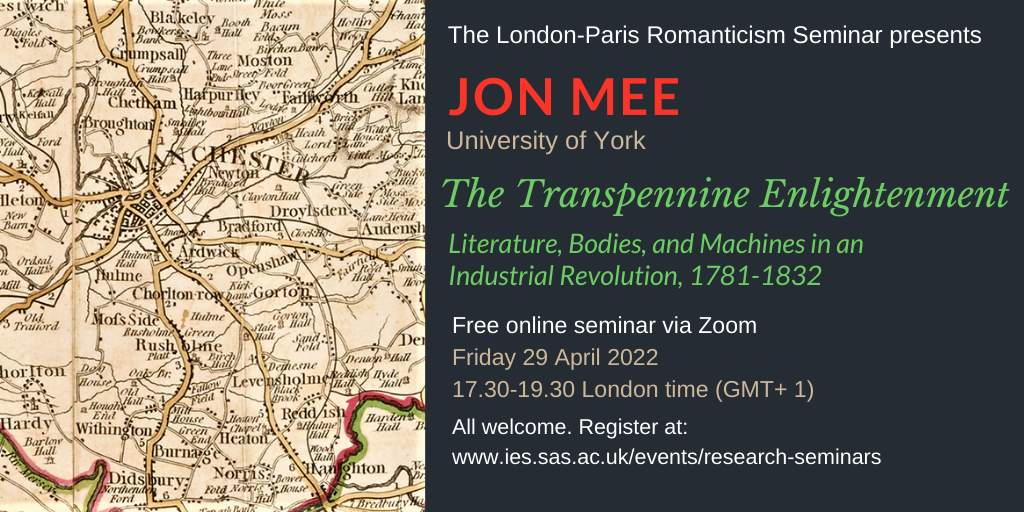
The next meeting of the London-Paris Romanticism Seminar will take place via Zoom on Friday 29 April 2022 at 17.30-19.30 London time (GMT+1). As our guest speaker, we are delighted to welcome Professor Jon Mee of the University of York, who will present a paper entitled The Transpennine Enlightenment: Literature, Bodies, and Machines in an Industrial Revolution, 1781-1832. This will be followed by a discussion in which questions from the audience are invited. The seminar will be chaired by David Duff.
The seminar is free and open to everyone. Prior registration is necessary. To book a place via the Institute of English Studies website, click here. When you register, you will be provided with a Zoom link and details of how to join the online forum. Whether you wish to contribute or simply to listen in, we invite you to join us.
Jon Mee is Professor of Eighteenth-Century Studies at the University of York. He has held visiting fellowships in Australia, India, and the United States. His books include Dangerous Enthusiasm: William Blake and the Culture of Radicalism in the 1790s (1992); Romanticism, Enthusiasm, and Regulation: Poetics and the Policing of Culture in the Romantic Period (2003); Conversable Words: Literature, Contention, and Community 1762-1832 (2011), and Print, Publicity, and Popular Radicalism in the 1790s (2016). He recently co-edited The Spirit of Controversy, a selection of Hazlitt’s essays, with James Grande. Jon is currently completing a book on cultural networks in the Industrial Revolution, due to be published in Fall 2023. The research for the book, on which the current paper draws, was supported by a British Academy-Leverhulme Senior Research Fellowship. He is also about to publish two edited collections of essays, co-edited with Matthew Sangster: Institutions of Literature, 1700-1900 (2022) and Remediating the 1820s (2023).
Regarding the topic of his paper, Jon writes:
‘The Industrial Revolution is a defining part of Romantic Studies, most often as a kind of absent cause, located in a space – metaphorical and geographical – outside the domain of literary history. In my latest project, Networks of Improvement, I address the phenomenon of the transpennine enlightenment as part of the intellectual formation that was both cause and effect of the industrial transformation of Britain. A network of individuals, infrastructure, and institutions distributed around the hub of Manchester, emerging in the romantic period as what would become Cottonopolis, the centre of a global system in cotton manufactures, the transpennine enlightenment experienced its own complex dialectic, where potentially progressive ideas transmuted into various forms of domination, perhaps always implicit in its characteristic ways of thinking, but by no means their necessary outcome. This paper discusses the key ideas of the transpennine enlightenment, its consequences for ideas of the literary in the romantic period, and the implications of a method that understands it as an emergent product of complex social relations rather than the epochal expression of prior class relations. One uncomfortable conclusion for romanticists is that its vision of limitless growth powered by human ingenuity may not be so much the antithesis of romanticism as part of the same cultural phenomenon.’